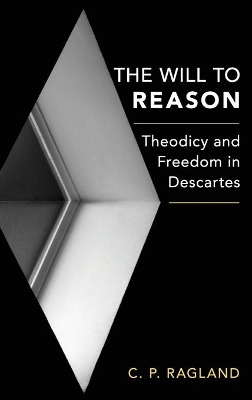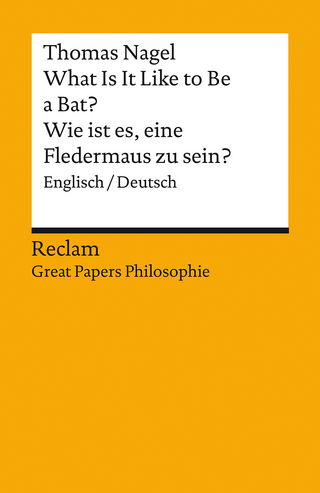
The Will to Reason
Oxford University Press Inc (Verlag)
978-0-19-026445-1 (ISBN)
Offering an original perspective on the central project of Descartes' Meditations, this book argues that Descartes' free will theodicy is crucial to his refutation of skepticism.
A common thread runs through Descartes' radical First Meditation doubts, his Fourth Meditation discussion of error, and his pious reconciliation of providence and freedom: each involves a clash of perspectives-thinking of God seems to force conclusions diametrically opposed to those we reach when thinking only of ourselves. Descartes fears that a skeptic could exploit this clash of perspectives to argue that Reason is not trustworthy because self-contradictory. To refute the skeptic and vindicate the consistency of Reason, it is not enough for Descartes to demonstrate (in the Third Meditation) that our Creator is perfect; he must also show (in the Fourth) that our errors cannot prove God's imperfection. To do this, Descartes invokes the idea that we err freely. However, prospects initially seem dim for this free will theodicy, because Descartes appears to lack any consistent or coherent understanding of human freedom.
In an extremely in-depth analysis spanning four chapters, Ragland argues that despite initial appearances, Descartes consistently offered a coherent understanding of human freedom: for Descartes, freedom is most fundamentally the ability to do the right thing. Since we often do wrong, actual humans must therefore be able to do otherwise-our actions cannot be causally determined by God or our psychology. But freedom is in principle compatible with determinism: while leaving us free, God could have determined us to always do the good (or believe the true). Though this conception of freedom is both consistent and suitable to Descartes' purposes, when he attempts to reconcile it with divine providence, Descartes's strategy fails, running afoul of his infamous doctrine that God created the eternal truths.
C. P. Ragland is Associate Professor of Philosophy at Saint Louis University. There he especially enjoys introducing students to philosophy as well as teaching and doing research in the history of modern philosophy and philosophy of religion. With Sarah Heidt, he is co-editor of What is Philosophy (Yale UP, 2001).
Abbreviations
Introduction
Notes to Introduction
Chapter One: Descartes' Deepest Worry
I. The "Deceiving Nature" Doubt
II. The Circle and the Two-Level Solution
III. Descartes' Engagement with Skepticism
IV. Conclusion
Notes to Chapter One
Chapter Two: The Fourth Meditation Theodicy
I. The Problem of Error
II. Descartes' Theodicy
A. Unreality of Error
B. Descartes' General Strategy (and the Eternal Truths)
C. Skeptical Theism?
D. The Big Picture
E. Free Will
F. Possible Error: The Big Picture Returns
G. The Theodicy Summarized
III. Does It Prove Too Much?
IV. Is It Circular?
A. Ought Implies Can
B. Assuming the Truth-Rule for Defensive Purposes
V. Does It Rest on a Flawed View of Freedom?
Notes to Chapter Two
Chapter Three: Freedom and Alternative Possibilities in the Meditations
I. The Definition Of Freedom
A. Retraction, Expansion, or Clarification?
B. Against Retraction
C. Expansion or Clarification?
II. Texts that Seem to Favor the Expansion Reading
A. The Explanatory Passage
B. The Great Light Passage
III. Pro-Clarification: The Infinite Will and the Image of God
A. Differences Between Divine And Human Freedom
B. The Analogy Between Divine And Human Freedom
C. Similarities and Differences: Signs Of An Implicit Distinction
IV. Conclusion
Notes to Chapter Three
Chapter Four: The Gibieuf Connection And The Later Descartes
I. The Gibieuf Connection
A. Background: Descartes and Gibieuf
B. Agreement About Freedom And Indifference
C. Explicit Agreement On Human Freedom?
D. Implicit Agreement On Human Freedom
E. What Agreement With Gibieuf Shows
II. Descartes' Later Texts On Freedom
A. Principles Of Philosophy (1644)
B. 1644 Letter To Mesland
C. The 1645 Letter to Mesland
Notes to Chapter Four
Chapter Five:
I. The Radical Libertarian Interpretation and the Meaning of CDD
II. Attention and The Moderate Libertarian View
III. The Compatibilist Reading
IV. Conclusion
Notes to Chapter Five
Chapter Six: Is Descartes' View Of Freedom Coherent?
I. Degrees Of Freedom: Preliminaries
A. An Initial Puzzle
B. Motivation and Degrees Of Freedom: Other Philosophers
C. Motivation and Degrees Of Freedom: Descartes
II. The 1645 Letter in Detail
A. The Meaning of "Elicited"
B. Spontaneity: Inversely Proportional to Indifference
C. Spontaneity: Absolute and Relative
D. Spontaneity and Perversity: Kenny's Objection
E. Why Kenny's Objection Fails
III. Final Worries
Notes to Chapter Six
Chapter Seven: Freedom and Divine Providence
I. Introduction: The Problem of Providence and Freedom
II. Concurrence And Providence: Scholastic Background
A. Aquinas' Picture
B. The Jesuit and Dominican Variations on Concurrence
C. Competing Theories of Providence
III. Descartes' Non-Causal View Of Providence
A. Against Supernatural Compatibilism
B. Correspondence with Elizabeth: Molinist Leanings
C. Three Objections to the Molinist Interpretation Refuted
IV. Providence and The Eternal Truths: A Hybrid View
A. My Interpretation Defended
B. Why Descartes Would Not Share My Worries
Notes to Chapter Seven
Conclusion: The Creation Doctrine Strikes Again
Bibliography
| Erscheinungsdatum | 12.03.2016 |
|---|---|
| Verlagsort | New York |
| Sprache | englisch |
| Maße | 157 x 236 mm |
| Gewicht | 499 g |
| Themenwelt | Geisteswissenschaften ► Philosophie ► Philosophie der Neuzeit |
| Geisteswissenschaften ► Religion / Theologie | |
| ISBN-10 | 0-19-026445-4 / 0190264454 |
| ISBN-13 | 978-0-19-026445-1 / 9780190264451 |
| Zustand | Neuware |
| Informationen gemäß Produktsicherheitsverordnung (GPSR) | |
| Haben Sie eine Frage zum Produkt? |
aus dem Bereich


